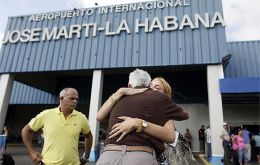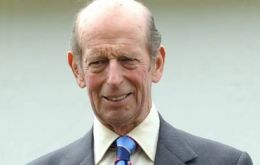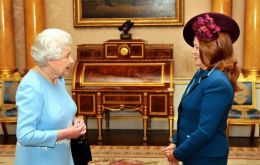MercoPress. South Atlantic News Agency
Politics
-
Wednesday, October 17th 2012 - 04:37 UTC
After half a century Cuba scraps travel restrictions, but they remain for ‘human talent’

Cuba will scrap much reviled travel restrictions starting in January, easing most Cubans' exit and return, state media said on Tuesday, in the Castro brothers’ regime first major immigration reform in half a century.
-
Wednesday, October 17th 2012 - 04:29 UTC
Argentina minister blasts credit rating agencies for putting out “terrorist reports”

Argentine Economy Minister Hernán Lorenzino ratified Wednesday’s down payment of the “Bonar X” dollar-bond for 200 million dollars and blasted credit rating agencies which along with speculators “set terrorist reports in order to make some profit out of it.”
-
Wednesday, October 17th 2012 - 04:17 UTC
Colombia peace talks back on schedule and begin Wednesday in Oslo

Colombia's government and Marxist rebels will start peace talks as planned on Wednesday in Oslo in a bid to end nearly half a century of conflict after logistical problems delayed departure of the delegates, Colombia's government said.
-
Wednesday, October 17th 2012 - 04:04 UTC
Duke of Kent will visit the Falklands as part of the Diamond Jubilee celebrations

Falklands Government House announced on Tuesday the dates for the visit to the Islands by His Royal Highness The Duke of Kent.
-
Wednesday, October 17th 2012 - 03:41 UTC
Ambassador Castro delivered credentials to Queen Elizabeth in ‘warm meeting’

Argentine Ambassador to the United Kingdom, Alicia Castro, delivered on Tuesday her credentials to Queen Elizabeth II in a meeting deemed as “warm,” that will help improve bilateral relations between both countries.
-
Wednesday, October 17th 2012 - 03:20 UTC
PM Cameron inspects air carrier construction: underlines “Made in UK badge”

British Prime Minister, David Cameron, visited Rosyth dockyard on Monday to see the work taking place to build the first of the two new Queen Elizabeth Class aircraft carriers.
-
Tuesday, October 16th 2012 - 13:44 UTC
The message from the Venezuelan elections

By Ambassador R. Viswanathan - The free, fair and peaceful Venezuelan elections on Sunday 7 October, with a clear and accepted outcome has restored the confidence of the world, which had some doubts about the vulnerabilities of Latin American democracies – especially after the constitutional overthrow of President Lugo of Paraguay in June this year and the unconstitutional removal of Honduran President Manuel Zelaya in 2009.
-
Tuesday, October 16th 2012 - 07:53 UTC
Uruguayan government and supermarkets agree to keep 2012 inflation below 10%

Uruguayan supermarkets pledged to help the government of President Jose Mujica to keep inflation below 10% at the end of the year even when in the first nine months of the year it reached 8.64%.
-
Tuesday, October 16th 2012 - 07:46 UTC
ARA Libertad conflict forces the resignation of the Argentine navy chief

The ARA Libertad conflict retained in Ghana has a new victim: Argentina’s Navy chief of staff Admiral Carlos Alberto Paz tendered his resignation and was replaced by his deputy Vice-Admiral Daniel Alberto Martin.
-
Tuesday, October 16th 2012 - 07:37 UTC
Brazil implements racial and income affirmative action at federal universities

The law which forces Brazilian federal universities to leave 50% of higher education seats to students from government schools and minorities such as blacks and indigenous became effective on Monday.
